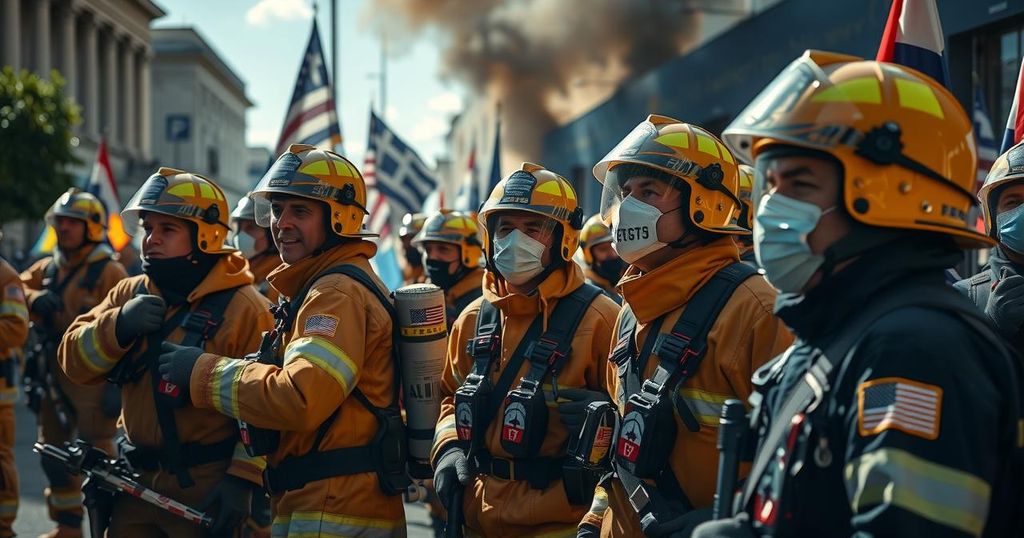On October 31, 2024, hundreds of seasonal firefighters protested outside Greece’s Civil Protection Ministry to demand permanent contracts, following the end of their temporary employment after a challenging wildfire season. The union asserts that climate change has extended the fire risk beyond traditional seasonal boundaries, necessitating a year-round firefighting presence. Several experienced firefighters were barred from newly opened positions due to age restrictions. As Greece grapples with prolonged fire seasons, the government’s response to these demands remains pending.
In a poignant demonstration outside Greece’s Civil Protection Ministry, hundreds of seasonal firefighters rallied to advocate for permanent employment contracts, following the conclusion of an arduous wildfire season on Thursday, October 31, 2024. Many of the demonstrators donned their distinctive tan and red uniforms as they utilized whistles and aerosol horns, brandishing Greek flags in solidarity. This gathering represents approximately 2,500 firefighters whose temporary contracts ceased on the same day, leaving them without immediate employment until potential re-hiring in May of the following year. Union representatives argue that climate change is significantly altering fire risk periods, necessitating a steadfast year-round firefighting force. The wildfire season of 2023 devastated an estimated 1,747 square kilometers (675 square miles)—a figure that exceeds four times the average area burned annually over the past decade, based on data from the European Union’s wildfire monitoring service. The destruction this year has so far impacted around 410 square kilometers (158 square miles), including catastrophic fires on the outskirts of Athens. Evangelos Tsoukalas, the president of the Seasonal Firefighters’ Association of Greece, voiced concerns that many experienced members, particularly those with six or more years of service, were precluded from applying for positions in specialized firefighting units introduced in 2023 due to an age limit set at 35 years. “There is an age cut-off (for those positions). And now our contracts are up, so we are being thrown out as seasonal firefighters,” Tsoukalas stated. Traditionally, seasonal firefighters operate from May to October; however, union officials maintain that their proficiency is critical, especially in light of increasingly severe fire seasons fueled by higher temperatures. According to preliminary assessments from the National Observatory of Athens, June and July of this year marked the hottest months on record in Greece. As of now, the government has not publicly responded to the demands for permanent employment, while the country seeks methods to enhance its firefighting strategies to confront the challenges posed by prolonged and intense fire seasons.
The increase in temperature and the frequency of wildfires in Greece has brought about heightened concern regarding the efficiency and effectiveness of its firefighting services. Seasonal firefighters, who generally serve during the peak months of May through October, face uncertainty as their contracts frequently conclude after an intensive fire season. Given the climatic changes and elevated temperatures, particularly noted in the summers of 2023, the necessity for permanent firefighting personnel has gained prominent attention, particularly as the nation confronts unprecedented fire-related challenges. The government’s adaptability to these evolving conditions remains a pressing issue, demonstrating a critical need for strategic planning.
In conclusion, the protests by Greece’s seasonal firefighters underscore the urgent need for permanent employment contracts in the face of escalating wildfire risks driven by climate change. With significant portions of the country experiencing devastating fires, the voices of these professionals call for recognition and support. The current gap between seasonal staffing and the demands of extended fire seasons necessitates a reevaluation of Greece’s firefighting strategies to ensure adequate preparedness and response capabilities for future wildfires.
Original Source: apnews.com






